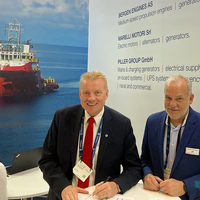MSHS to Sell Bergen Engines in the Americas

Norwegian power solutions provider Bergen Engines has entered a sales and service partnership agreement with Motor Services Hugo Stamp Inc. (MSHS) to support its marine and land service offering in both North and South America.This is the first of several new partnership deals Bergen Engines is expected to sign under its new ownership.David Miller, Managing Director of Bergen Engines Inc. said, “The Bergen Engines group is confident this agreement will be an important step to ensure our customers a world-class service to our engines and gensets…
DSC Dredge’s Miller Retires

On October 16, 2018, after 38 years in the dredging industry, David Miller, SVP/COO and part owner of DSC Dredge, LLC announced his retirement. Miller embarked on his career in the early 1980’s when he began working for Kenner Marine & Machinery (KMM). Following several consecutive KMM positions, David completed his final 10 years there as a field service specialist.Miller was one of the original founders of Best Equipment Technologies, Inc. (BEST), established in 1998, located in Poplarville, MS. BEST operated as a steel fabrication shop and dredge manufacturer.
Study: An Arctic Oil Well Blowout Could Spread More Than 1,000km
Oil from a spill or oil well blowout in the Arctic waters of Canada's Beaufort Sea could easily become trapped in sea ice and potentially spread more than 1,000 kilometres to the west coast of Alaska, a World Wildlife Fund study showed on Friday. The WWF contracted RPS Applied Science Associates to model 22 different oil spill scenarios and map the spread of the oil, potential impact on the water and shoreline, and interaction with sea ice, wildlife and the surrounding ecology. Types of oil spills analyzed included shipping spills, shallow-water blowouts and deep-water blowouts. The BP Plc Macondo oil well rupture in 2010 that unleashed more than four million barrels of oil into the Gulf of Mexico was a deep-water blowout.
ACBL Announces Appointments
Paul Brotzge has been named Vice President, Finance, Treasurer and Controller. He was previously Vice President, Finance and Controller. Brotzge has been with the Company for twenty-three years. Ben Huber has been named Vice President, Business Development. His previous position was Vice President, International. He joined ACL in August 2002. David Jahnke has been named Vice President, Dry Cargo Sales. He was previously Vice President, Grain Sales. Jahnke has been with ACL since 1992. Del Wilkins has been named Vice President, Vessel Operations. He was previously Vice President and General Manager, Gulf Coast Operations. Wilkins joined ACBL in November 1993. Paul Book has been named Director of Barge Maintenance. He was previously Director, Audit & Compliance.
ACBL Announces New Appointments
American Commercial Barge Line has announced a number of new appointments. ACBL, headquartered in Jeffersonville, In. is an integrated marine transportation and service company. ACL filed for Chapter 11 protection on January 31, 2003. Paul Book has been named Director of Barge Maintenance. He was previously Director, Audit & Compliance. Mark Dougherty has been named Director, Vendor Vetting. He was previously a Quality Analyst. David Miller takes the helm of Director, Marketing Services. He was previously Director, Marketing Support. Mario Munoz has been named Director, Fleets. He was previously Director of Fleet Operations. John Fox has been named Liquid Unit Tow Planner. He was previously West Canal System Planner. Gary Ruff has been named Gulf Tow Planner.
Guns on Coast Guard Vessels Trigger Protest
Reuters reported that machine-gun fire will puncture the calm of the Great Lakes if the U.S. Coast Guard follows through on its plan to set up firing ranges there, despite volleys of criticism fired by environmentalists, boaters and politicians. As part of its expanded responsibilities to police U.S. coastlines in the name of national security, the Coast Guard has mounted gas-powered machine guns on the decks of its patrol boats and cutters, capable of firing 600 rounds a minute. To train its seamen to fire the powerful weapons on the lakes' choppy waters, the Coast Guard proposed establishing 34 target ranges at least 5 miles offshore.





